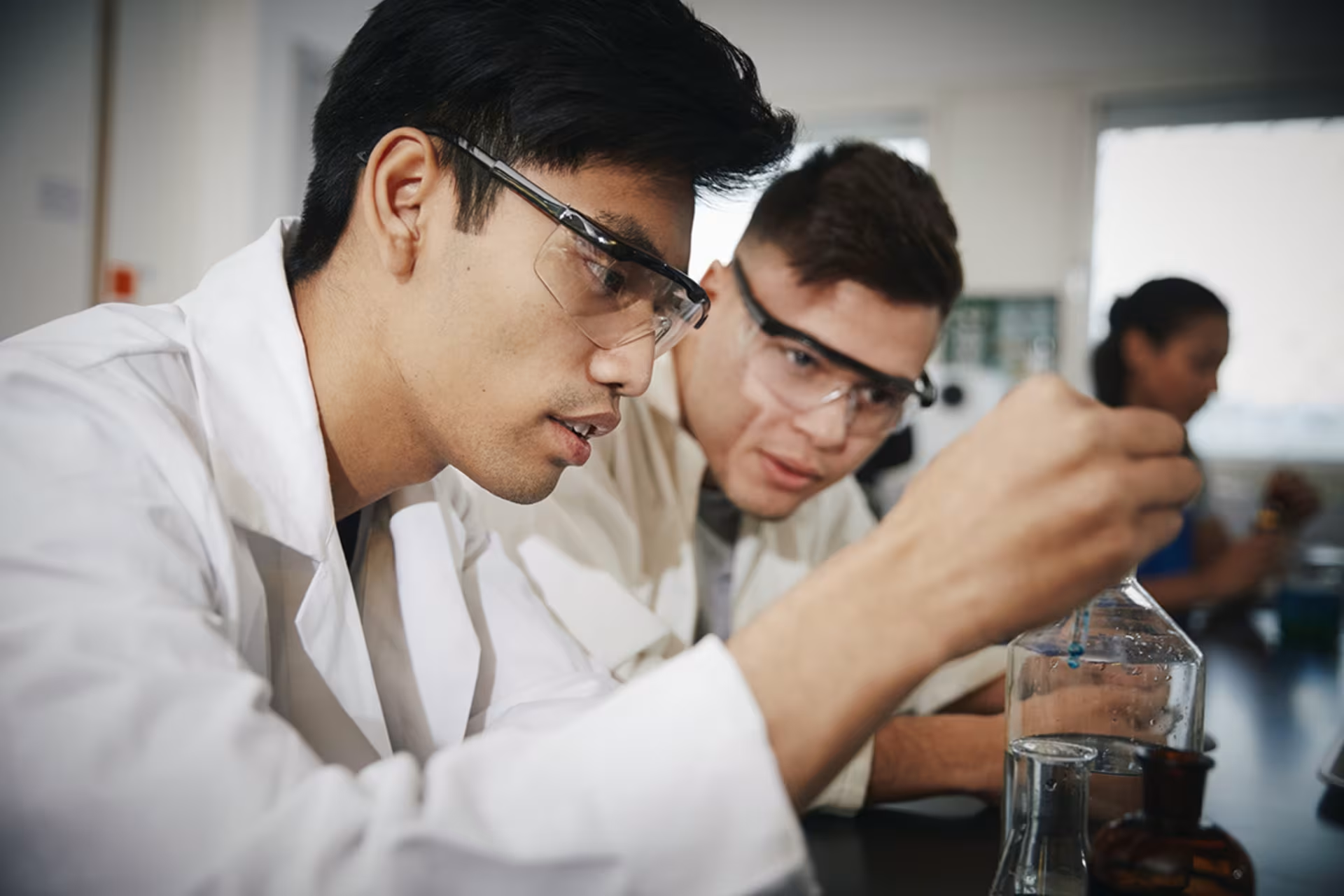
College of Natural Sciences Research Opportunities
College of Natural Sciences
Use this menu to discover more about the College of Natural Sciences and its resources.
Advance Scientific Knowledge With Practical Experience
Whether you need research science sources for a project, hands-on labs and workshops, or a chance to explore natural science research, the College of Natural Sciences at Grand Canyon University is here for you. GCU is dedicated to enhancing academic pursuits and excellence by bridging classroom learning with practical challenges, issues and innovations.

"One of the things that makes GCU unique is the Research and Design Program … created with the primary goal of providing our students with key experiences necessary for graduate school programs … The fact that the program allows our faculty to do something they love — that’s just icing on the cake!"
"One of the things that makes GCU unique is the Research and Design Program … created with the primary goal of providing our students with key experiences necessary for graduate school programs … The fact that the program allows our faculty to do something they love — that’s just icing on the cake!"

"One of the things that makes GCU unique is the Research and Design Program … created with the primary goal of providing our students with key experiences necessary for graduate school programs … The fact that the program allows our faculty to do something they love — that’s just icing on the cake!"

"One of the things that makes GCU unique is the Research and Design Program … created with the primary goal of providing our students with key experiences necessary for graduate school programs … The fact that the program allows our faculty to do something they love — that’s just icing on the cake!"


Canyon Emerging Scholars Program
The Canyon Emerging Scholars (CES) program supports faculty-led research and student mentorship within the College of Natural Sciences. Grounded in the Boyer model of scholarship, CES encourages applied, integrative and discovery-based approaches to inquiry. Students collaborate across disciplines, with a focus on reflection, community impact and hands-on problem-solving.
In the College of Natural Sciences, CES students contribute to innovative work through specialized labs and research groups, including:
Antimicrobial Discovery Lab
Investigate desert plant compounds to combat drug-resistant microbes, combining fieldwork, antimicrobial research and advanced chemistry.
Canyon Neuroscience Group
Explore brain and nervous system function through clinical and lab-based research, using methods from human studies to molecular tissue models.
Drug Discovery Group
Conduct hands-on pharmaceutical research through student-led projects in molecular design, bioassays and therapeutic development to discover new treatments.
Environmental Sustainability Group
Develop tools to improve forensic accuracy and speed, while providing hands-on experiences with real techniques.
Forensic Science Research Lab
Develop tools to improve forensic accuracy and speed, while providing hands-on experiences with real techniques.
Henry Vandyke Carter Club: Anatomy Art
Create anatomical art through hands-on studies using real bone specimens and cadavers, while exploring the intersection of science and creativity in medicine.
Microbial Biotechnology Division
Research cyanobacteria for biofuel production, offering hands-on experience in biotech and molecular techniques.
Performance Optimization, Wellness and Exercise Research (POWER) Lab
This lab supports research in health, nutrition, biomechanics and cognitive strength, offering you hands-on experience with advanced testing tools.
Physical Science Research Lab
Engage in hands-on experiences using advanced equipment and wet lab techniques, including FTIR, NMR, mass spectrometry, X-ray crystallography and SEM.
Prosocial Animal Lab
Study animal responses to distress and uncover the cognitive and emotional roots of altruism across species.
"I was able to get really involved in the program and did a lot of research, so by the time I went into my anatomy classes I already had so much experience. I’m so thankful for that."
"I was able to get really involved in the program and did a lot of research, so by the time I went into my anatomy classes I already had so much experience. I’m so thankful for that."
"I was able to get really involved in the program and did a lot of research, so by the time I went into my anatomy classes I already had so much experience. I’m so thankful for that."
"I was able to get really involved in the program and did a lot of research, so by the time I went into my anatomy classes I already had so much experience. I’m so thankful for that."
Scholars and Research Publications
Through faculty-led initiatives and services that cultivate a community of learning and opportunity, GCU can provide research in the realm of natural sciences. This can include educational publications that promote excellence and nurture student growth.
Nurturing creativity and critical thinking across diverse scholarly fields, the Center for Innovation in Research On Teaching (CIRT) aids in fostering academic growth. The College of Natural Sciences faculty are frequent contributors to research that strives to enhance excellence within the collaborative community of educators.
Every year, the CIRT releases the Journal of Instructional Research (JIR) online. Within its pages, you can explore guidelines for grant applications, gain insights into executing natural science research projects, access teaching profession's best practices, tackle student-oriented science challenges and delve into various other subjects.
Guaranteeing adherence to federal regulations and the utmost ethical benchmarks for all GCU-sponsored research, the Institutional Review Board (IRB) plays a pivotal role. Discover the comprehensive oversight and evaluation process the IRB employs for research initiatives.

Dive into discovery. Explore, experiment and innovate to help shape the future of science.
- Interagency Coordination Group on Antimicrobial Resistance (IACG). (2019 April). No Time To Wait: Securing the Future From Drug-Resistant Infections. Retrieved Aug. 15, 2023.

